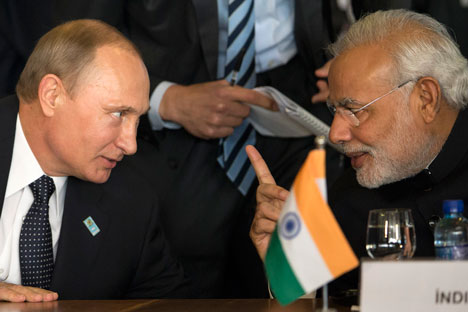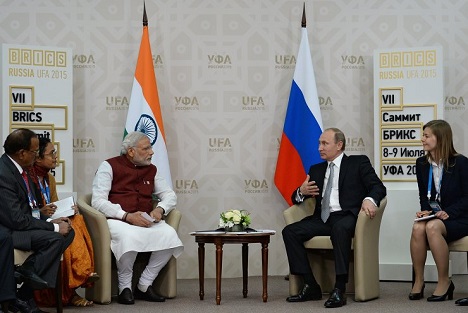Will Modi restore trust Vajpayee enjoyed with Putin?

Narendra Modi and Vladimir Putin on the sidelines of the BRICS summit in July. Source: AP
A lot has been written about the forthcoming Moscow visit of the Indian Prime Minister Narendra Modi for the 16th annual India-Russia summit with President Vladimir Putin.
The interest in the Indian PM’s Moscow visit is natural since this will be Narendra Modi’s first official visit to Moscow as the leader of the world’s largest democracy to the capital of the world’s largest nation by size.
The media is awash with a plethora of bilateral contracts and agreements spanning the sectors of defence and energy; both conventional and civil nuclear; to easing visa regimes for business travellers and tourists which are likely to be signed during Modi’s Moscow visit.
This author, who has covered bilateral visits of two countries’ leaders over the last 25 years, feels that this time there are sub-surface challenges, which Modi will have to face during his Moscow talks with President Putin, who is going through a critical phase of his presidency. Russia is under renewed pressure from its cold war rivals – the United States and NATO alliance - which continue the eastward advance into the former Soviet space. The Ukraine crisis is also a fall out of this Washington policy.
Traditional friendly India-Russia relations, have not only survived global transitions in both countries from ‘licence Raj’ and Socialist systems to the market economy, but also the system of governance in post-Soviet Russia. In spite of the dramatic changes and considerable shrinking of its geopolitical space in the wake of the Soviet collapse, Moscow continues to remain New Delhi’s key partner in Eurasia, not only due to India’s dependence on Russian armament supplies, but also due to commonality or similarity of vital national and geopolitical interests.
If the credit for retaining friendship with post-Soviet Russia should be given to former Indian Prime Minister PV Narasimha Rao, it was Prime Minister Atal Bihari Vajpayee who qualitatively transformed it into the bilateral strategic partnership by signing the Strategic Partnership pact with President Putin, during the Russian leader’s maiden India visit in October 2000.
During his maiden Russia visit as prime minister in November 2001, Vajpayee struck a goldmine of highest mutual trust with Putin, which characterised bilateral relations till the end of NDA rule in 2004. Putin, then a novice in high global politics, highly respected India’s poet-premier as a trustworthy senior, experienced colleague.
The episode of Pakistani President Pervez Musharraf’s Moscow visit is enough to judge the chemistry and level of trust the two leaders had developed. It was in February 2003, when General Musharraf’s plane was landing at Moscow airport, Putin called up Vajpayee to brief him about his forthcoming talks with the Pakistani leader. Three days later, when Musharraf’s aircraft was still taxiing to take off, Vajpayee was already in the know of his talks in Moscow, when Putin again phoned the Indian Prime Minister.
However, Putin’s efforts to sustain the level of bilateral trust with the UPA’s leadership, which replaced NDA, were not very successful, although he had highest regard for Prime Minister Dr Manmohan Singh.
Shortly after the UPA takeover in New Delhi, Putin had invited Sonia Gandhi to Russia in the hope of further cementing bilateral trust. However, in the course of 10 years of UPA rule, relations with Russia were adrift on the backdrop of growing bonhomie with Washington.
The delay in the delivery of refurbished ‘Admiral Gorshkov’ aircraft carrier, resulting in massive cost overruns, dominated the India-Russia arms agenda. The negative hype over this single deal, initiated by Prime Minister Vajpayee, although inked during UPA rule, put in jeopardy other ambitious projects of the Vajpayee government including joint development of a fifth generation fighter aircraft (FGFA) and multirole transport aircraft (
Russia still believes that its MiG-35 was disqualified in the first round of mega-tender for the acquisition 126 MMRCA combat aircraft for political reasons. Short-listed aircraft including the ‘Rafale’ did not meet all the parameters of the initial requirements of the Indian tender.
Although, Modi has met with Putin several times and both seem to have developed some chemistry, rebooting in bilateral relations is becoming necessary. Moscow, which has been wary of New Delhi’s pro-US drift in the last years of UPA rule, still needs to be convinced that the Modi government’s overtures with Obama will not undermine traditional ties.
Perhaps, Modi understands Moscow’s concerns. “Russia has always been a source of strength for us. It remains important for our future, too,” he said addressing India’s top commanders on board Russian built aircraft carrier
Now is the time to convert words into deeds, as Russia has expressed readiness to contribute to Modi government’s policy of ‘Make in India’ to make India self-sufficient in defence. There are open debates in the Russian media about giving India weapon systems capable of removing its concerns over growing Chinese activities in Indian Ocean. Even President Putin, commenting on the firing of its Calibre cruise missiles from Caspian warships on Islamic State targets, noted that Russia is closely interacting with India in the field of cruise missiles and is ready to further advance cooperation beyond BrahMos.
In 2001 Modi, as the Gujarat Chief Minister was the member of Prime Minister Vajpayee’s official delegation. Briefing his team on his talks with President Putin he is reported to have said: “They (Russians) have everything we need and are ready to give us what we want, so no need to go elsewhere.”
Such was the level of mutual trust which Vajpayee enjoyed with Putin, however, under the influence of focused anti-Putin propaganda, this trust eroded over time. The biggest achievement of Modi’s Kremlin summit with Putin would be how far he succeeds in the restoration of this trust.
While visiting Moscow earlier in the course of preparations for the summit External Affairs Minister Sushma Swaraj had called Russia a ‘time tested friend of India.’ Will Russia be able to say same thing after Modi’s Moscow visit?
All rights reserved by Rossiyskaya Gazeta.
Subscribe
to our newsletter!
Get the week's best stories straight to your inbox
